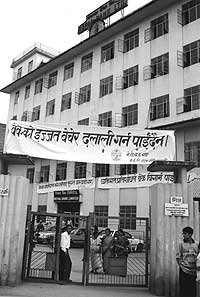 The most vocal critics of Nepal Rastra Bank's recent blacklisting directive are the handful of big businesses who haven't paid their outstanding loans for god knows how many years.
The most vocal critics of Nepal Rastra Bank's recent blacklisting directive are the handful of big businesses who haven't paid their outstanding loans for god knows how many years. The FNCCI is the staunchest advocate for relaxing labour market regulations. Flip through the pages of the New Business Age and you'll find prominent industrialists sermonising on anything from budgetary matters to trade issues. Readers on whom the irony of these maladies is lost are missing a fundamental point. There is nothing wrong with individuals and groups with vested interests making their voices heard on matters of national importance. In fact, they have every right to do so. But when they have an unchallenged monopoly on opinion in the media and when their opinions transcend their immediate interests and the interests of their cohort, there is a serious problem.
Public policy discourse in Nepal is hopelessly devoid of the 'public' component. The National Planning Commission remains a monolith that deigns to favour the nation every five years with its periodic action plans. As the plans enter the implementation phase-token public participation notwithstanding-sustained, non-partisan public enquiry into the nuts and bolts of the progress of these activities is glaringly absent.
Take for example the 40 percent tax the Ministry of Forest and Soil Conservation decided to levy on Community Forest User Groups (CFUGs). The Federation of Community Forest Users in Nepal (FECOFUN) was immediately on a war footing. Questioning the government's motive behind such a drastic measure, FECOFUN went as far as to accuse the government of trying to arrest the progress made by CFUGs since the handover of national forests to communities. The government, on the other hand, cited the inequities inherent within user groups in the decision making and allocation process to justify the need for intervention.
To assume that FECOFUN speaks for all the users within the 2,700-plus user groups it represents is to delude ourselves. But even as the battle between the government and FECOFUN drags on, it's sad not to find a single rigorous, objective and impartial dissection of this issue in the media. Stakeholder identification is an indispensable exercise of any kind of development related study these days. But rather than being vocal and active participants in activities which could potentially determine their futures, stakeholders are mute-their voices often hijacked by small, concentrated groups of people who claim to represent them.
Similar examples are abundant. When the government decided to raise fuel prices in April, it took a foreign economist working in Nepal (the World Bank's country director) to attempt to explain to the public the counterintuitive argument as to why the hikes were indeed good for us. Rigorous though his analysis was, it came a bit late as the ultra-politicised protests had already caused the loss of one life in Butwal.
The restructuring saga of Nepal Bank Limited and Rastriya Banijya Bank isn't very different. These banks, one state owned the other previously so, have been funnelling money into the capital from all over the country. When it was discovered-in an almost Enron-like fashion-that they were engaged in lending practices that are far from ethical, especially to politically connected big businesses who had no intention of paying back the loans in the first place, alarm bells were sounded.
Keen on mopping up the filth, the central bank contracted out the management of these two banks to foreign consultants and most recently, instituted a set of hardline corrective measures, the most controversial of which, so far, has been reinforcing the use of legal channels to recover delinquent loans.
The tragedy is, all you get to read in the newspapers regarding this issue is either blunt government press releases or loony private sector whining. Where are the concerns of small shareholders whose equity stake in Nepal Bank Limited, for example, has been wiped out? Where are the concerns of the small depositors and borrowers who bear the direct brunt of the misguided lending of their banks? Who writes about what good things a healthy, competitive and well functioning financial market can do to the economy?
In the same vein, yes, deregulating labour markets is most probably a good thing. It is likely that a more competitive market for labour will do wonders for its mobility and productivity. Yet, it is also true that such a move would increase the government's welfare responsibility. Minimum wage floors would have to be enforced and working conditions, especially in the industrial and manufacturing sectors, constantly monitored.
But can FNCCI-the vanguard of labour market deregulation in the media and in public opinion-be expected to care the tiniest bit about the welfare concerns of workers? Economists and journalists reporting on economic issues and Tribhuban University academics should realise that policy wars at the implementation level are won not by producing esoteric manuscripts no one reads but by reaching out to the people, engaging in public debates and swaying public opinion.
Else, businessmen will continue to pose as economists and students like me will have to continue taking distance-learning courses from them.
Binit Sharma is the pseudonym of an economist. [email protected]


